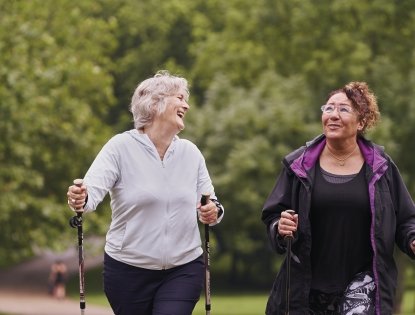Biodiversity and Physical Activity
We understand that being involved in sport or physical activity can be extremely time-consuming, and sometimes can just be about getting the game on.

We also know that more and more of us are experiencing the challenges that climate change is bringing, and the effects it’s having on our ability to do the things we love.
Did you know that by thinking about your outdoor spaces, gardens, pitches, or the things you buy, you can help tackle climate change and limit its effect on your physical activity?
Sport England have produced a handy guide on biodiversity and sport - read on to find out more…
What is biodiversity?
Biodiversity is the variety of life on Earth. The UK is one of the most nature-depleted countries in the world. Since 1970, UK species have declined by about 19%. Nearly one in six species are now in danger of becoming extinct. We need your help!
Why do we need a biodiverse world?
We need lots of plants, animals, and microbes (the small living things around us that we can’t see, like bacteria) to keep us and our planet healthy. The poor condition of the UK’s natural environments can make it harder and harder to take part in sport and physical activity. For example:
- Poorer air quality can make it harder for us to move about.
- Flooding is happening more often in the places we get active in.
- The climate is warming, and a lack of natural shade is making some of our active spaces too hot to take part in sport and physical activity.
- The poor quality and variety of our natural environments can also make them less usable and less attractive to visit. This could mean fewer opportunities to watch elite sport or limited community and wider social events being hosted.
Protecting our environment has never been more important
There are lots of ways that wildlife in all its forms helps us. It:
- Cleans the air we breathe.
- Pollinates plants to grow the food we eat.
- Cleans the water we drink and swim in.
- Keeps soil healthy to grow our food.
- Absorbs rainfall and reduces flooding.
- Absorbs carbon dioxide and reduces greenhouse gas emissions.
- Provides resources, such as medicines.
- Breaks down organic waste.
- Enhances the places we play, relax, and participate in, to improve our health and wellbeing.
It’s clear that we need to cherish and care for our wildlife, so, in turn, it looks after us!
What can you do to help?
It’s everyone’s responsibility to look after our environment. This includes making a commitment to supporting biodiversity. There are some low-cost ways everyone can get involved, such as:
- Encouraging participants to act as sustainability champions. This can send positive messages to your group and wider community about helping to protect wildlife.
- Taking part in wildlife surveys. Citizen science is a fun way to get involved in science projects, often without any previous knowledge needed.
- Sponsoring a species or habitat or raising funds for a local wildlife trust or charity.
- Having a noticeboard to tell people what can be done to encourage biodiversity.
- ‘Volunteering for nature’ for a day with your club or group.
If you have your own outdoor space, or support an organisation that does, there’s lots you can do to biodiversity. We know that there’s often not a lot of time to spare, so here are some quick things you can consider to get you started:
- Make sure that vehicles, including cars and coaches, don’t park under or close to trees where they can damage surface roots.
- Plant a tree, plant a hedge, or sow a wildflower patch.
- Join No Mow May.
- Install bird or bat boxes and put out bird feed.
- Create a wildlife pond, even a small area is enough to help wildlife.
- Avoid pesticide and herbicide use on outdoor spaces.
- Try saving rainwater for use on outdoor spaces.
If you have a bit more time, you could follow the principles of the Sports for Nature framework:
- Protect nature and avoid damage to natural habitats and species.
- Restore and revive nature where possible.
- Understand and reduce risks to nature in your supply chains.
- Educate people to inspire them to take action for nature.
You can show your commitment by signing up to the IUCN Sport for Nature initiative and visiting their website for more information.
You could also find out more about your Local Nature Recovery Strategy (LNRS), identifying which plants and animals belong in your area and what the local plans are for keeping them safe alongside the needs of local people.
Find your local authority's LNRS to help you decide what actions you can take. You can also provide feedback about the kind of outdoor spaces that might help people get active near you.
What if you don’t have any outside space?
We appreciate some organisations operate in indoor spaces or rented facilities. You can still play an important role in supporting wildlife by making sure the things you buy (goods and services) don’t harm, or better still, benefit wildlife. Here are some ideas:
- Buy locally grown, seasonal or organic food where possible.
- Look for food products that are responsibly sourced.
- Buy compostable teabags, which don’t contain microplastics, or fairly traded coffee.
- Make sure all wood products are FSC-certified.
- Talk to your suppliers to ensure they are acting responsibly. Ask for their environment policy.
- Spend better and waste less: prioritise buying products that are kind to the environment and avoid using single-use materials.
- Making sure you have sustainable lighting and facilities choices.
More information
HSP is fully committed to a greener sporting future and has a 'Environmental Sustainbility Commitment and Action Plan'. We also have a number of resources on our 'Supporting Sustainable Sport in Hertfordshire' webpage.
For more information contact a.ledbury@herts.ac.uk
Sign up for our General Newsletter...
Receive the latest updates to your inbox.
Sign up for our Quarterly Funding Newsletter…
Receive the latest funding opportunities to your inbox.
Funding Newsletter
Our Funding Newsletter keeps you up to date with all the latest news and funding pots available.
Get in touch…
If you have a generic question please email the Herts Sport & Physical Activity Partnership team: hspinfo@herts.ac.uk






